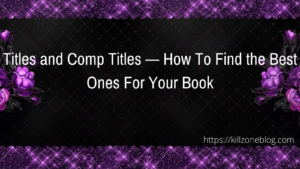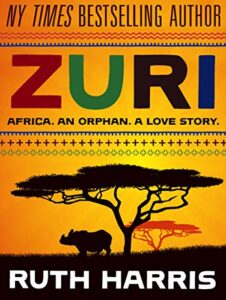
Bee to the blossom, moth to the flame; Each to his passion; what’s in a name? —Helen Hunt Jackson
* * *
I’ve been thinking a lot about book titles lately since my latest book was renamed by the publisher just prior to its release. More on that later.
Coming up with a title for your book may be one of the most important decisions you make. But how do you decide what’s the perfect name?
Blurb.com had a list of criteria that I grabbed from their website and added some of my own comments. A good title would be:
- Concise (3-5 words) – Short titles stand out to readers. Long ones are harder to remember. On the other hand, consider The Guernsey Literary and Potato Peel Pie Society or The 100-Year-Old Man Who Climbed Out the Window and Disappeared. They didn’t do too badly.
- Intriguing – a title that will stand out and make readers want to buy your book. A few that I like are The Hitchhiker’s Guide to the Galaxy, The Remains of the Day, and The Art of Racing in the Rain.
The site also mentioned a good title would be:
- Original
- Informative
- Easy to say
- Attention-grabbing
- Memorable
I considered some of the books I have loved and what their titles were:
- To Kill a Mockingbird by Harper Lee
- A Tree Grows in Brooklyn by Betty Smith
- The Adventures of Huckleberry Finn by Mark Twain
- West With the Night by Beryl Markham
- The Woman in White by Wilkie Collins
All of these meet the requirement of being concise. With the exception of Huckleberry Finn, they are intriguing and original. They are also informative and easy to say. I’m not so sure about attention-grabbing. I guess that depends on the reader. Finally, I suppose a title is memorable only if the book is one you remember.
A couple of other attributes I’ve noticed in the book naming field:
- Trendy – Remember how many books were published with the word “Girl” in the title?
- Play on words – Popular with cozy mysteries.
* * *
Reading about the art and science of naming a book got me thinking about how I had come up with the titles of my five published novels. In the order published, they are:
The Watch on the Fencepost – That was the working title, but I wanted a catchy, clever name for the book. One day when I was about halfway through the writing process, my husband and I took a walk to talk about the title. I tried out a few possibilities (A Watch in Time, Death Watch, etc.), but nothing clicked with us. Finally, Frank said, “Why don’t you just leave it the way it is. It’s unique and intriguing.” So that’s what I did. And there’s a catch at the end of the book that emphasizes the title.
Dead Man’s Watch – The title refers to a watch that was taken off a dead man’s wrist. Finding the watch turned out to be an interesting problem that led to a surprising conclusion. I also liked the trendy “Dead Man” part of the title.
Time After Tyme – After the university librarian Mr. Tyme was found dead, a couple of teams of amateur sleuths spend their time looking for a culprit. This title was inspired by the use of word play in cozy mystery titles.
Lacey’s Star – I thought this title might be too prosaic. I considered All but the Brightest Stars, but opted for the simpler title because it refers to the final clue that leads to a murderer. I like to think that readers will finish one of my books and realize the relevance of the title to the story
That brings me to the fifth book, Another Side of Sunshine.
The working title was The Other Side of Sunshine, which is also the first line of the first clue in the story. Much of the book is a reflection on shadows (pun intended), so the title seemed perfect to me. However, the publisher didn’t want the title to begin with the word “The,” so she suggested Another Side of Sunshine. In the long run, I think it’s just as good, maybe better.
* * *
Speaking of changing titles, The Huffington Post had an article on classic books where the original title was changed. Here are a few:
- Ernest Hemingway’s The Sun Also Rises was originally titled Fiesta.
- Somerset Maugham’s Of Human Bondage was originally titled Beauty from Ashes.
- Margaret Mitchell’s Gone with the Wind was going to be Tomorrow Is Another Day, Not In Our Stars, Tote the Weary Load, or Bugles Sang True.
- Harper Lee’s To Kill a Mockingbird was originally titled simply Atticus.
- Carson McCullers’s The Heart Is A Lonely Hunter was originally titled The Mute.
- John Steinbeck’s Of Mice and Men was originally titled Something That Happened.
- Jane Austen’s Pride and Prejudice was originally titled First Impressions.
- William Golding’s Lord of the Flies was originally titled Strangers From Within.
* * *
So TKZers: How did you determine names for your books? Do you have a favorite title of your books? Would you rename any of them if you could? What are some of your favorite titles from other authors? What do you think about the name changes in the list of classics?
* * *
ANOTHER SIDE OF SUNSHINE
A Middle Grade Mystery Novel
The Reen & Joanie Detective Agency is open for business, and the first assignment is to find a treasure hidden by the mysterious “Mr. Shadow.”
“Fans of From the Mixed-Up Files of Mrs. Basil E. Frankweiler and The Westing Game will find familiar pleasures here, wrapped in fresh clues and grounded by a heroine who learns to trust her instincts—and the people around her.” —Prairie Book Reviews
Click the image to go to the Amazon book page.



 ★★★★★“WOW! WHAT A STORY!”★★★★★
★★★★★“WOW! WHAT A STORY!”★★★★★